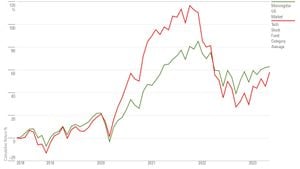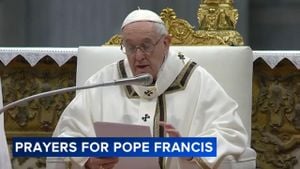Olympique de Marseille faced intense scrutiny after suffering a 3-0 defeat to AJ Auxerre on February 22, 2025, leading club president Pablo Longoria to level serious accusations of corruption against the French footballing authorities. Following the match, held at the Stade de l'Abbe-Deschamps, Longoria's comments about "real corruption" shook the football community, bringing to light existing frustrations over officiate decisions.
During the contested match, Marseille’s defeat was marked by several contentious calls, including the dismissal of Canadian defender Derek Cornelius, who received his second yellow card shortly after the hour mark. Longoria stated, "This is real corruption," indicating his belief the loss was not just down to the performance of his players but to decisions he deemed orchestrated by refereeing bias.
Fabrizio Ravanelli, the sporting advisor for Marseille and former club striker, echoed Longoria's sentiments by denouncing the referee's conduct. He proclaimed, "All of France saw Stinat's decisions were nonsense. It was scandalous refereeing." Ravanelli highlighted how Cornelius's sending-off directly impacted the outcome of the match, which saw Marseille trailing before conceding two more goals.
Longoria's outburst came after he expressed his disappointment over what he felt was the unfair treatment of his team. The tension within the club was palpable as they found themselves ten points adrift of league leaders Paris Saint-Germain, compounded by the sense of injustice brewing among players and officials.
The claims put forth by Longoria and Ravanelli did not go unchecked. Philippe Diallo, head of the French Football Federation, issued a strong rebuttal the following day, condemning their remarks as defamatory. Diallo stated, "To question the integrity of our officials is defamatory, unacceptable and reprehensible," arguing such comments diminish the credibility of French referees. This conflict exemplifies the increasingly fraught relationship between clubs and officials, particularly within the current climate of mistrust plaguing Ligue 1.
Marseille's dissatisfaction wasn’t solely isolated, as others within the footballing community voiced their concerns about officiate performance. Notably, other players, including Adrien Rabiot and manager Roberto De Zerbi, joined the chorus criticizing the refereeing standards present during matches across the league. Rabiot referred to the officiate's handling of the game as “quite scandalous,” highlighting the emotions running high among players affected by questionable calls.
This controversy is just one of many casting shadows over Ligue 1, which has recently faced accusations surrounding the refereeing system. With Marseille's performances under the spotlight, particularly as they contend for the title, the angst observed demonstrates how deeply intertwined the perceptions of officiate legitimacy are with the success of clubs.
Longoria's remarks could have serious repercussions. With potential disciplinary measures on the horizon from the French footballing authorities, it remains to be seen how this will affect the morale of the team or the leadership direction of Marseille moving forward. Some fans are already apprehensive about what such allegations might entail for the club’s reputation.
The situation addresses broader issues related to the integrity of refereeing not just for Marseille but the entirety of the French league, raising questions about the organizational structure and the level of oversight provided. Discussions surrounding potential reforms have begun to surface, particularly against the backdrop of the Super League debates, with many calling for greater accountability within the league’s refereeing corps.
It's evident these recent accusations signify more than just frustrations after a defeat—they encapsulate the broader discontent among clubs versus officials within French football. With Marseille amid such crises, they could be at the forefront of demanding significant changes, igniting conversations about transparency and fairness, and perhaps steering some direction for the future of Ligue 1.
The culmination of Longoria’s accusations, the rebuttal from Diallo, and the reaffirmed calls for integrity across the league showcases the persistent tensions existing within French football. The outcome of these developments may very well define Marseille’s path as they strive to overcome their current challenges both on and off the field.



